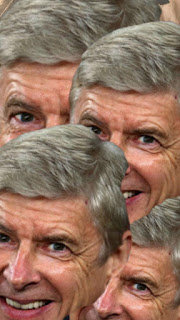There's Only One Arsène Wenger
Yesterday brought the sad news that Arsène Wenger, the manager of Arsenal, has decided to step down after more than two decades at the helm of the club. Wenger's career at Arsenal has unfolded like a classic three-act drama:
Act 3: Wenger Out -- After presiding over the most successful period in the club's history, including the move to a new, state-of-the-art stadium in 2006, Wenger sees Arsenal take a step backwards. After finishing either first or second in the Premier League for 8 straight years, Arsenal goes a decade finishing either 3rd or 4th. A significant segment of the Arsenal fan base turns on Wenger, arguing that the game has passed him by. "Wenger Out" banners appear at gatherings all over the world.
Roughly speaking, over the course of twenty-two years in charge of Arsenal, Wenger has gone from unknown commodity to pathbreaking innovator to over-the-hill traditionalist. I suppose it is an arc that most of us are doomed to follow in our careers.
I first started following Arsenal in 2002. My brother was living in London at the time; he became a fan and I followed suit. Those first couple of years were absolutely brilliant, highlighted by an unbeaten season and the graceful play of Thierry Henry and Dennis Bergkamp. It has been painful to watch the team's trajectory since then. This year has been particularly bad -- the team has lost to less-talented clubs and their play has lacked both passion and coherence.
Even as the team has underperformed, there is still much to admire about Wenger. He is a smart, dignified public presence. He never throws his players under the bus when the team loses. And he sticks to his principles -- he has continued to attempt to play attacking football even as fans and commentators have implored him to improve the defensive solidity of his team.
I'm not sure what lessons about life or leadership to take from Wenger's story. It is hard not to conclude that he stayed too long at the party -- he probably should have retired several years ago. It is also hard not to conclude that his greatness and his weakness are inextricably bound together: the same self belief that enabled him to overcome the doubters during the early years of his tenure made him resistant to change at the end of his reign.
Watching Wenger as the losses and empty seats and vituperation have mounted has been has been an unpleasant experience. He deserves better. Now that he has announced his departure, it looks like he will get it -- the appreciations are starting to pour in from players and pundits alike.
The best tribute that I can offer to Wenger is that he added to the amount of beauty in this world. At their best, his Arsenal teams were a joy to watch, full of invention and style and grace. Unique among his coaching peers, Wenger aspired to artistry. In an interview a couple of years back he described his work this way: “My never-ending struggle in this business is to release what is beautiful in man.” I doubt sincerely that we will ever see another manager like him. He will be missed.


